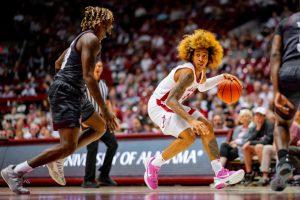‘Not everyone wants to go back’: UA professors prepare for return to in-person classes
August 18, 2021
Returning to school is a chance for a fresh start — new year, new classes, new professors. Yet, something feels familiar about the return to campus this fall.
As the University returns to in-person classes for the fall semester, professors have received mixed messages about offering online options to students. Some students and teachers are nervous about returning to face-to-face operations as COVID-19 cases continue to surge.
In an email to University deans, UA Provost James Dalton stressed a return to “normal course delivery methods.”
“Our goals are always for every student to succeed, and to maintain the highest level of quality teaching, while safeguarding the health and safety of all UA faculty, staff, and students,” Dalton’s email said. “We also want to ensure that the faculty are prepared — and have the latest information and resources — to play their part in the University meeting these goals.”
Dalton said it’s important to stick to the planned in-person teaching method unless otherwise instructed by him.
Peter Edgar, an MFA student studying creative writing and journalism, will teach an introductory English course in the fall and said he thinks the decision to eliminate hybrid teaching was made without safety in mind.
“What I imagine is happening is when the University and plenty of other institutions are making the judgment about what to do, they’re putting science and safety on one side of the scale and putting the bottom line on the other side,” he said. “I don’t think that’s the way it should be.”
Dalton said he’s encouraging professors to “prepare for teaching flexibility” and upload all course materials to Blackboard so that students who test positive for COVID-19 can access them. Dalton recommends using Panopto, a video recording service, to record lectures to maintain face-to-face instruction.
Ross Bettis, a senior studying communications, said he believes the new variants make hybrid teaching necessary, and the return plan puts professors and students in a “vulnerable position.”
“If we put students and professors in a horrible position to get sick, because of the delta variant or the lambda variant, we are going to have an explosion of cases on campus,” Bettis said.
The delta variant, a highly contagious strain of the virus, became the dominant strain in July. Fully vaccinated people have experienced breakthrough cases, but are unlikely to become seriously ill. The lambda variant, another strain of the virus, has recently been reported in America with the potential capability to neutralize antibodies from some vaccines. Currently, 99% of COVID-19 deaths are from unvaccinated people.
Professors are not allowed to ask a student’s vaccination status or insist that students get the vaccine. The University will not disclose the vaccine status of students to professors.
Edgar said “a lot of people, but not everyone” in his department have been vaccinated, and he is concerned with the spiking case rates caused by the delta variant. Edgar said the University shouldn’t return to normal operations “if we can’t make sure it’s safe.”
As someone who is required to teach to complete his degree program, Edgar said he feels particularly frustrated with the circumstances.
“This responsibility of teaching is what allows us to stay on campus and it almost feels like a little bit of agency has been taken from us,” Edgar said. “It just feels like our hands are tied a little bit and that we can’t do everything to protect ourselves. There’s a layer of red tape — or maybe a couple of layers of red tape — that we have to go through to do that, which just doesn’t feel super empowering.”
Bettis said he feels confident that hybrid options would be helpful to professors and students who don’t want to be “shoulder to shoulder in class.”
Dalton shared the UA COVID-19 syllabus statement in an email to deans on Aug. 10. He said the University has the right to move online at any point in the semester.
The syllabus statement urged faculty, staff and students to maintain a commitment to safety. The University will not provide a tuition refund if classes move online.
Edgar said he finds it difficult to teach without clear protocols.
“The horse is already out of the gate, so I understand that it’d be really hard and controversial for them to do a complete turnaround and require stricter restrictions,” Edgar said. “I want to sympathize with the adults who are trying to make these decisions, but I don’t necessarily sympathize with the rubric for the decision-making. I think safety has to come first, and we know enough now to make a lot more informed decisions. We’re going in the opposite direction.”
Edgar said he’s working hard to keep himself and his students safe without overstepping, but it’s going to be hard to build community in the classroom.
“I’m a 23-year-old English teacher,” he said. “I’m not out here to police students. I’m teaching them how to write. It is a boundary issue. Culturally, we feel very suspicious of one another, and these rules don’t discourage that suspicion.”
Dalton said professors should “encourage students to get vaccinated” and remind them of the $40 Bama Cash incentive for students who report their vaccinations by Aug. 28.
Bettis said he had multiple classes over Zoom this past year and thinks that a remote option should be offered to all students so that they don’t feel unsafe in a classroom.
“We’re pretty much just having to play the waiting game at this point,” Bettis said. “Should students and professors have to suffer from the University’s decision-making? No.”
Under current health and safety guidance, professors should be quarantined if they contract COVID. If they are not well enough to continue teaching, the class can be canceled. Otherwise, classes can be taught over Zoom with permission from department chairs and deans.
Bettis said he hopes the University will provide online options, but that the idea of going “back to school” is inherently flawed during an increase in COVID-19 cases.
The University’s Division of Strategic Communications did not respond to multiple email requests for comment.





















